Jump to: Dr Siva Thambisetty, Professor Alex Voorhoeve, Dr Tania Burchardt, Dr Seeta Peña Gangadharan, Professor Sandra Jovchelovitch, Melissa Weihmayer (PhD candidate)
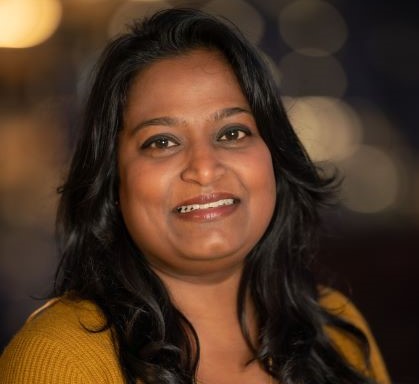
Dr Siva Thambisetty
Associate Professor of Law, LSE Law School
What kind of knowledge exchange activities have you been involved with?
Since 2019 I am acting as an adviser at the UN Intergovernmental Negotiations on a new Oceans Treaty – the Biodiversity Beyond National Jurisdiction Agreement which seeks to form new rules and institutions over activities on the high seas, including the exploitation and study of genetic resources in areas beyond national jurisdiction. The Treaty is something of a cross between an environmental and intellectual property agreement and involves complex (technical and legal) and emerging scenarios. It takes place at the UN in New York city, and has just had its 5th round of negotiations. Each round lasts two weeks, and involves delegates from all state parties, and groups. I attended two rounds as adviser to the Pacific Small Island States, having been appointed by the Office of the Pacific Ocean Commissioner based in Fiji. In the last round I was an expert on the G77 Group +China Chair’s team led by Pakistan. The COVID hiatus included a session that was conducted online.
In these roles I prepare analyses of conference room negotiating positions and the draft treaty, liaise with other experts and publish policy briefs in appropriate outlets for the groups I am advising. I have organised an interdisciplinary international workshop for G77 group negotiators on intellectual property over marine genetic resources and equitable sharing of benefits. I have spoken at side events and intersessional workshops. I also help prepare talking points for the negotiations, sometimes responding to arguments or helping with formulating positions in real time. Some of the work is behind closed doors.
What have the benefits been for you?
The two-week sessions are very intense, with long unsociable hours, but it has opened up a world where law and meaning-making is undertaken in diverse ways that are not always visible to the academic observer. I learnt that knowledge positions are not as important as positioning, and most diplomats want to know the punchline to your 10,000 words explaining a normative legal principle. To be persuasive and communicate well to an audience that is highly skilled but non-specialist when you are not party to the full political picture, can be a challenge but is extremely rewarding when it goes well.
The project has allowed me to adopt a broad set of professional values and responsibilities, and validated my research as transformative in its ambition. The work also imparts humility in the face of larger processes at work, and some despair at the dysfunction at the heart of global governance – I regard these as precious insights that will continue to enrich my writing. I am also now in a position to help craft the interpretation and enforcement of the Treaty when it is finalised. There have been publications and spin-off effects on other projects – including work I did with colleagues on vaccine equity during the pandemic, and to an influential study report on how digital sequence information is treated under the Convention on Biological Diversity, and an interdisciplinary study report to a High Level Panel on the Ocean Genome.
Attending UN negotiations in possibly the world’s most expensive city is out of reach for many developing country experts, further skewing the negotiating ability of larger, well-funded delegations. The KEI grant allows me to preserve my independence and presence in these negotiations which has been broadly beneficial as much of my analysis is published. The project so far has also been extraordinarily interesting, and yes, even fun. I have many stories to tell including on ‘bag’ diplomacy and a rollicking sushi dinner in a basement that I will save for the book!
What would be your advice for those thinking of undertaking a KEI project?
There are different kinds of impact driven work you can undertake within a long project like this. Some will be quick and gratifying, others are slow burning and can be frustrating. Through it all it is important to maintain the a divide between passionate advocacy and rigorous and transformative scholarship. Each context will be different but every academic embarking on impact driven or knowledge exchange work should be self-conscious of how their agency is perceived and what that might mean for your ability to persuade and communicate. I also think it is important not to be overly instrumental in your thinking and contribution. So, if you are up against tenure or promotion timelines, think carefully about the choices you make as KEI work can soak up a lot of time that is not always recognised or rewarded by institutional processes. Personally, my expertise is highly specialised and the project converges on research decades in the making. The grant was a fantastic opportunity to make a difference on an issue that is potentially very iniquitous, and I have enjoyed it very much.
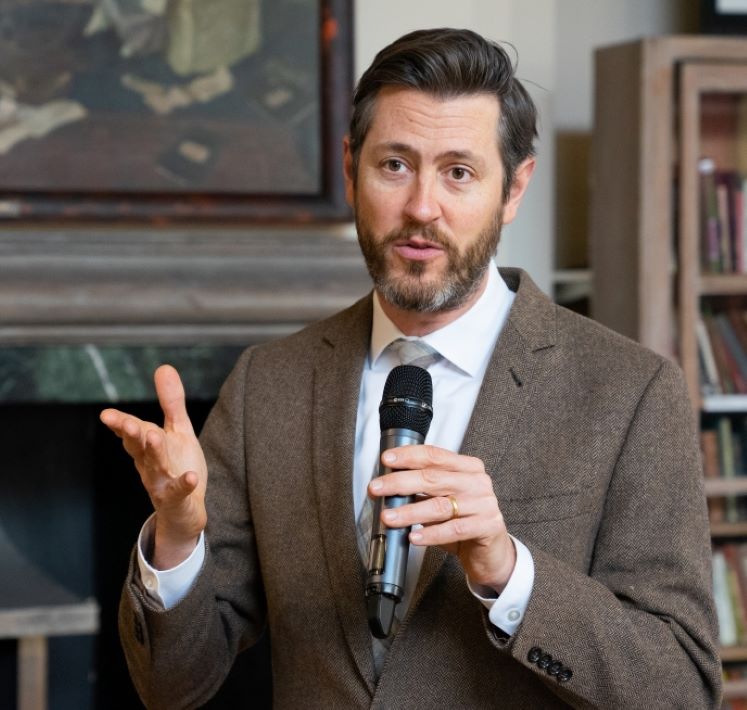
Professor Alex Voorhoeve
Professor in the Department of Philosophy, Logic and Scientific Method
What kind of engagement and impact activities have you been involved with?
I have worked in an advisory/research capacity for: the World Health Organization as member of the Consultative Group on Equity an Universal Health Coverage (2012-2014) and for their work on Social and Movement Measures During Covid-19 (2020); the World Bank for their work on Open and Inclusive Decision-Making in Financing UHC (2019-2023); and the Bank of England/UK Treasury on the “Digital Pound” (2023-present). For the WHO and World Bank, this took the form of co-authoring (with other academics from many disciplines and policy-makers from around the world and these institutions) reports or research papers that served as background for a report. A very important part of engagement were meetings with a wide range of stakeholders in which ideas and drafts were discussed, as well as launch/outreach events with policy-makers and academics once these reports were finalized. I have done dozens of those, and these are hugely important to getting the ideas out there and discussed. LSE helped greatly by funding some of these events, as well as a translation of a report into Spanish.
What have the benefits been for you?
I learned a great deal about health policy from the close collaboration with excellent academics from other disciplines and with policy makers. In addition to the policy reports, this collaboration led to many co-authored academic publications in venues I would not have been able to publish in as a philosopher working alone, such as the Lancet and Nature Medicine. This taught me about many topics I would otherwise not have understood in such depth, such as how to understand the Right to Health, or aspects of how health insurance schemes work. The reports also generated a lot of attention and debate, and appear to have led to changes in policy in a number of institutions and countries, which is inspiring—as an academic, one doesn’t always imagine one’s ideas will shape policy.
What were the benefits for your partners/participants?
In each case, the request do to the work came from the external partner. They had questions that they wanted answered about how to design policies (or policy advice to countries) that required a multidisciplinary group of thinkers to answer. Many of my co-authors on the project had more policy expertise or expertise in particular social sciences, like health economics. What I added was expertise in thinking through principles of justice: distributive justice (who should get what), relational justice (how people should interact with each other) and procedural justice (who should be involved in policy decisions). Policy-makers face such questions of justice all the time, and a dialogue with someone with expertise in these topics is something they value.
What would be your advice for those thinking of undertaking an engagement and impact project?
Make sure there is a clear demand for your ideas from your partner and participant and institutional backing for the project; otherwise your work will not be taken up. If you are involved as one among many people, try to be assured of the quality of your collaborators and especially of the project leadership. I was fortunate that on each project, the leaders were extraordinary.
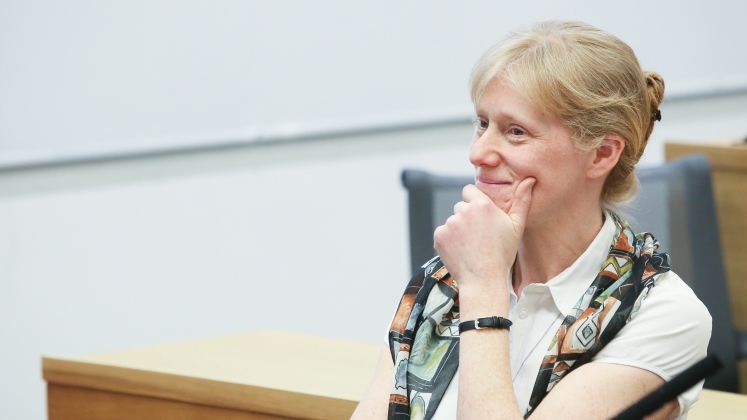 Dr Tania Burchardt
Dr Tania Burchardt
Associate Professor in the Department of Social Policy and Director, Centre for the Analysis of Social Exclusion (CASE)
What kind of knowledge exchange activities have you been involved with?
I’ve been fortunate to have opportunities for both broad and fairly high-level knowledge exchange, and for deeper and more intensive activities. The joint workshop we organised last year with the International Monetary Fund on social protection in a changing world would fall into the first category. That provided a platform for a wide range of LSE research to feed into the IMF’s development of a strategic framework for their engagement on social protection. The day had a real buzz about it and several people remarked on the constructive – though often challenging – nature of the discussion. At the deeper, more intense end of the spectrum, my colleague Polly Vizard worked with Age UK to hold a series of events for practitioners on supporting the nutrition of elderly hospital inpatients, using findings from our research. We heard first-hand about some of the logistical problems for ward staff in providing the right food at the right time with the right assistance and we were able to share our insights about identifying patients most at risk.
What have the benefits been for you?
As a social policy analyst, doing research that makes a difference is one of my main motivations. So for me knowledge exchange is not so much a supplementary activity as a crucial part of what I do. I find it stimulating – and often challenging – to try to translate research findings into forms that can be communicated to the relevant actors, whether they are policymakers, practitioners, or intermediaries such as journalists and people working in NGOs. And through engaging with these people I am often humbled to learn that I have only seen one part of the picture – there are more aspects of the problem to be researched and understood.
What would be your advice for those thinking of undertaking a KEI project?
Go for it! There is lots of support at LSE – from Research Division, Public Affairs, Press Office, academic colleagues – so you don’t have to do it alone. You may be surprised to discover that there are more people out there with an interest in your findings than you thought.
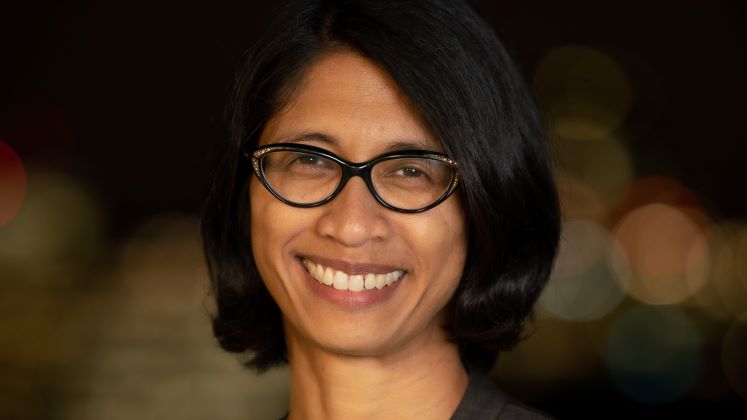
Dr Seeta Peña Gangadharan
Associate Professor, Department of Media and Communications
What kind of knowledge exchange activities have you been involved with?
Table Meetings and Lunches: Since the invitation of inaugural members to the Table, eight four-hour online bi-monthly Table meetings have been coordinated. The meetings were intentionally designed to enable participatory processes of interaction and decision making, trust building, knowledge sharing and a collective co-design process of the Table’s strategies and activities.
Table Sessions: During Table Sessions, guest speakers are invited who have experience in the field, for a deep dive into relevant topics – listed below. After the speakers share their knowledge and insights, Table Sessions offer space to reflect on how the shared insights related to the context in which Table Members operate. More specifically, Sessions are designed to see how to make research and organising insights actionable. Sessions could also be joined by external participants on invitation, which contributed to new connections while maintaining a trusted and more intimate environment needed for optimal engagement.
Bi-weekly Newsletters: Every two weeks, a newsletter with relevant articles, reports, events, campaigns and opportunities was curated by the Table Co-Directors and shared with Table Members. The Newsletter not only led to increased understanding of the topic, but it also kept Table Members informed about certain events or opportunities they could join, as well as about activities of other Table Members which would be included in the newsletters.
What have the benefits been for you?
Well prepared, facilitated Table meetings enabled knowledge generation, sharing analysis and experiences, offering avenues for mutual support. In Table sessions with guest speakers, learnings was made relevant and actionable in respective contexts of the Table Members. The speakers invited to the Sessions appreciated the participatory nature of the conversations, as well as the opportunity to introduce their work to a broader public.
By the process of curating the newsletter, the Table staff kept informed about the latest activities around the issue as well as opportunities for the Table.
Most connections with actors in the broader field are made during our programmatic events where we interface with different organisers, researchers and organisations who are working on key aspects of anti-racism, racialised criminalisation, policing and surveillance technologies. Spaces we organised sparked new alliances and collaboration of players throughout Europe.
What would be your advice for those thinking of undertaking a KEI project?
It is helpful to think of the longterm horizon, not only the shortterm horizon (that comprises the KEI funding cycle) of our project. Our Table is cultivating the ground for future research and further knowledge exchange. We are working with Table members who are at a very beginning stage of understanding of the impacts of data-driven technologies on their work and on the minoritized, racialized communities which they represent and serve. So thoughtful, coordinated KEI activities are intentional and necessary. Such is the challenge of working with groups serving underserved populations. KEI provided us seed funding, and we have succeeded in attracting greater funding for the project and allowing us to pace ourselves and see the impacts of our work over time.
 Professor Sandra Jovchelovitch
Professor Sandra Jovchelovitch
Professor of Social Psychology, Department of Psychological and Behavioural Science
What kind of knowledge exchange activities have you been involved with?
With many including blogging, social media and appearances in traditional media, dialogue workshops with research participants aiming to devolve and validate findings, policy seminars with multiple stake-holders here at the School, providing expert evidence to the UN, UNESCO and local governments, to incorporating non-academic stakeholders in the design, execution and analysis of research (a very difficult but ultimate rewarding knowledge exchange process).
What have the benefits been for you?
To stay in touch with the world beyond academia and learn from non-academic audiences. The institutions and communities I work with bring a fresh and rich perspective to the phenomena I study and I feel rewarded by a real sense of relevance and contribution to social change. My own research shows the importance of understanding and recognising different domains and forms of knowledge and engaging in knowledge exchange brings this full circle.
What would be your advice for those thinking of undertaking a KEI project?
Consider the actors, institutions and communities which your research can potentially affect, seek a conversation from an early stage and if possible, work with them. Multiple stake-holder research partnerships are a challenging but ultimately rewarding process that can leverage citizens’ knowledge and expand the boundaries of our own scientific knowledge.
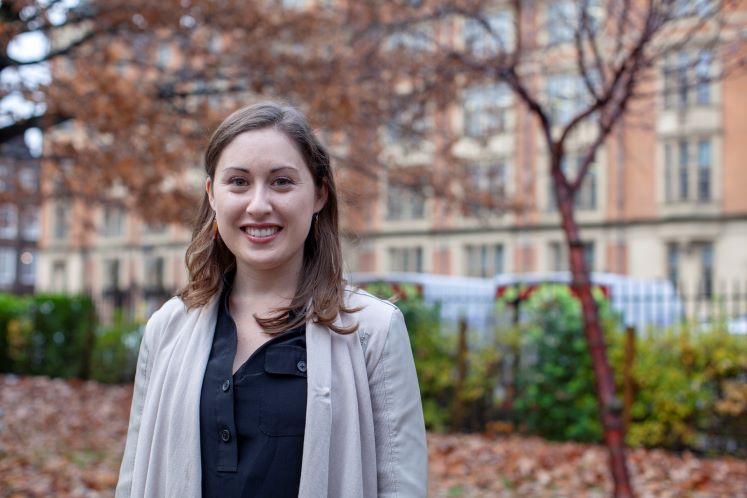
Melissa Weihmayer
PhD candidate in Regional and Urban Planning Studies, Department of Geography and Environment
What kind of engagement and impact activities have you been involved with?
Engagement and impact have always been an important part of my PhD research, as my research topic – how local governments understand and develop responses to forced migration – is policy- and practice-driven. Bringing my research findings to policy and practitioner spaces was a key aim of my PhD.
I have contributed research findings to a variety of policy audiences. For one project, I outlined different methods for building the capacity of local governments in a policy brief that conveys the potential for local governments in the UK to innovate as they take on asylum responses. I wrote about this on the LSE British Politics and Policy blog. I incorporated these ideas into a toolkit with options for developing an ‘‘asylum team’’ and coordination structures. I also discussed processes for evidence-based policymaking within local governments, drawing from the case of asylum, with other UK councils and networks of local governments elsewhere, including at an LSE workshop with the Japan Local Government Centre.
What have the benefits been for you?
This engagement has deepened my research findings and outputs and ensured that my research is well-attuned to the rapidly changing policy environment and the problems faced by practitioners working on this topic. The networks I have built through engagement have helped me to reach a wider non-academic audience. This has involved getting critical feedback from practitioners and sharing new ideas with them that have changed how they conceptualise their own work.
On a personal level, this engagement and network-building were inspiring and kept me motivated throughout my PhD. Academic discussions tend to focus on critique, while discussions with practitioners and policymakers are often more about how they can directly use the research. They engaged with my work in a very creative way.
What were the benefits for your partners/participants?
My partners and research participants lacked access to academic journals and literature, and did not have the time to really think through issues and document their learning. I could explore the literature to help them understand whether there was already substantial research on their issues: for example, sharing key elements of the longer history of UK asylum policy to a variety of London partners working to find new solutions for managing this policy area. I did this during a workshop I conducted with support from the LSE PhD KEI Fund, which was attended by representatives from London Councils and the Greater London Authority, among other partners. This helped them to take a step back to reflect on the bigger picture and understand their immediate challenges in a new light. In the policy brief I developed, I worked with a graphic designer to visualise asylum response structures within local governments in London; this demonstrated the variety of response structures and also flagged some ‘‘good practice’’ that other local governments could adopt.
What would be your advice for those thinking of undertaking an engagement and impact project?
It’s important to think through engagement activities and potential impact from the start of a research project. If the research questions are addressing a theoretical gap in the literature rather than responding to a policy or practice dilemma, then the project may not easily translate to non-academic audiences. Engaging throughout the project can be incredibly helpful both for the research process itself and for enabling impact after you develop research findings. One element to be prepared for is for engagement to be two-way: it’s not just you disseminating your ideas as a researcher to a particular audience; it’s also you learning from that audience and taking on board their feedback throughout the project.
Being as specific as possible about the audiences that would be interested in your research questions, and the activities they might also find useful while engaging in the research, is paramount to actually achieving engagement and impact goals. This likely requires consultation with potential audiences when planning the project and adjusting the research questions accordingly.
Finally, I think it’s important for PhD students to recognise that though engagement and impact activities can greatly enhance both the PhD experience and the research, it is work that needs to happen alongside other PhD ‘‘deliverables’’. Outputs that are important for moving your PhD forward are not the same as outputs that policy and practitioner audiences can use – it is a parallel workstream. It is a worthwhile one, but it helps to be explicit about this in your project planning. Your supervisors may also caution you that at certain points PhD deliverables need to be prioritised over engagement and impact work.